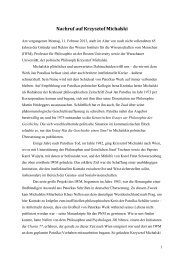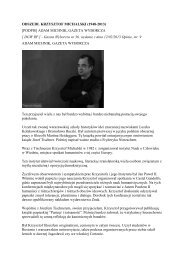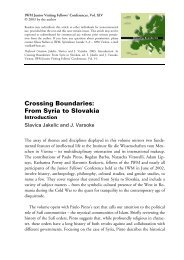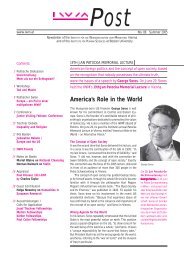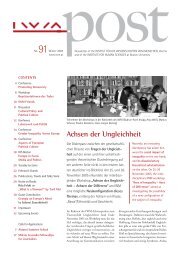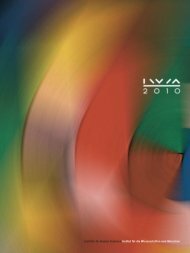Questionable Returns: Introduction - IWM
Questionable Returns: Introduction - IWM
Questionable Returns: Introduction - IWM
Create successful ePaper yourself
Turn your PDF publications into a flip-book with our unique Google optimized e-Paper software.
ANDREW BOVE: INTRODUCTION 5<br />
pher, asks why the science of history has only recently opened itself to the insights<br />
of the other human sciences, even though the latter became thoroughly historicized<br />
during the nineteenth century. He seeks to use this belated “opening” not to divide<br />
and compartmentalize the study of history, but on the contrary to revive the notion<br />
of histoire generale in a way consistent with the historicistic insights of the past two<br />
centuries. It is an ambitious project, and Barberi takes us through one stage of it: a<br />
reconstruction of the history of media that builds on the linguistic insights of Saussure.<br />
Sociologist Veronika Wittmann provides a provocative “analysis against the homogenization<br />
of feminist theory and practice in the context of the so-called First<br />
and Third Worlds.” Beginning with an analysis of power relations between European<br />
and non-European nations, she proceeds to show how these relations have distorted<br />
the approaches of “First World” feminists to their “Third World” counterparts<br />
– an opposition Wittmann calls into question. She shows how race prejudices<br />
and the “naturalization” of cultural differences have yielded falsely universalistic<br />
feminist claims, and calls for critical reflection on the role of socioeconomic inequality<br />
between Europe and non-Europe, North and South, white and black in<br />
feminist discourse. To begin with, Wittmann suggests that feminists pay greater attention<br />
to the actual life circumstances of women outside Europe and North America.<br />
The last two papers deal variously with the status of the political in philosophic<br />
thought about human life. In her modestly titled “comment,” Meike Schmidt-<br />
Gleim tarries with the question of whether class struggle plays any necessary role in<br />
the democratic theory of Claude Lefort, or whether for him it is just another contingency<br />
in the open and indeterminate space of contemporary democracy. Drawing<br />
on linguistic and psychoanalytic theory, Schmidt-Gleim attempts to recover the<br />
importance of class struggle in a way consistent with a thoroughly contingent understanding<br />
of modern democracy. Proper attention to the “symbolic” and the<br />
“imaginary” as well as the “real” reveals the originary but nevertheless decentered<br />
role of class struggle. In the background is Lefort’s own move away from Marxism<br />
towards a more general and reformist conception of democratic politics, and for<br />
this reason the paper makes an important contribution to our understanding of the<br />
course of the French Left in the decades since 1968.<br />
In the last article, Kamila Kulik discusses Hannah Arendt’s civic interpretation of<br />
the Socratic daimon, and makes a case for its importance in Arendt’s attempt to<br />
elaborate an authentic political dimension within modern life. Kulik links Arendt’s



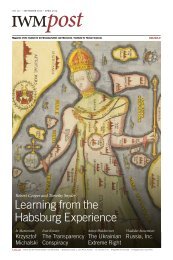
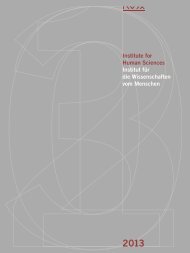
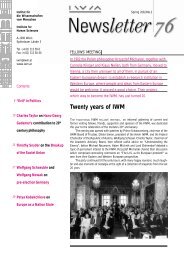
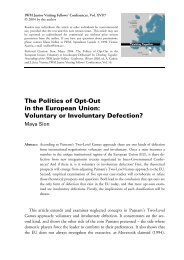
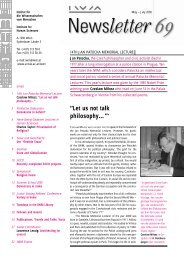
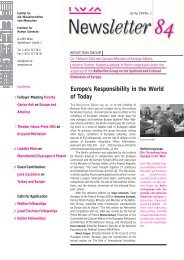
![POSZUKIWAÅ PRAWDY I ZABAWY [PODPIS] PROF ... - IWM](https://img.yumpu.com/23611273/1/184x260/poszukiwaa-prawdy-i-zabawy-podpis-prof-iwm.jpg?quality=85)
